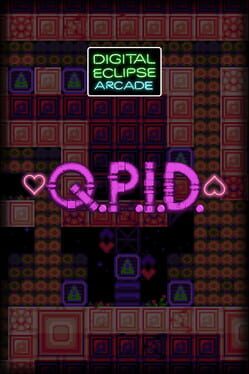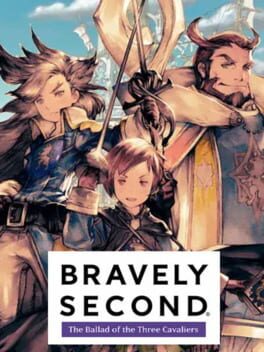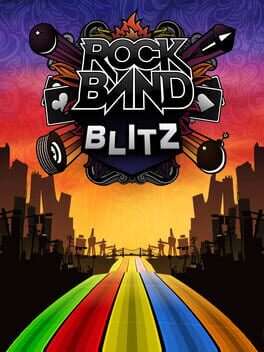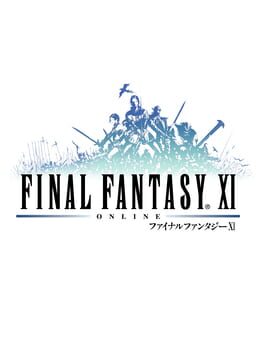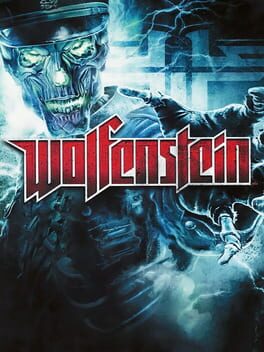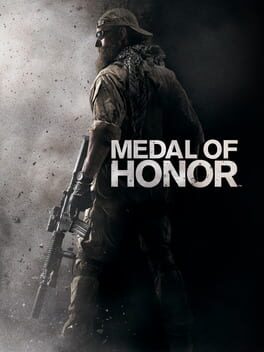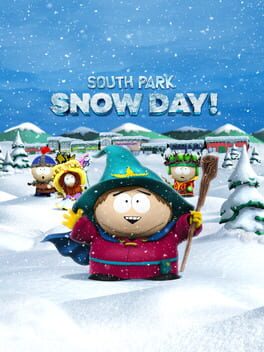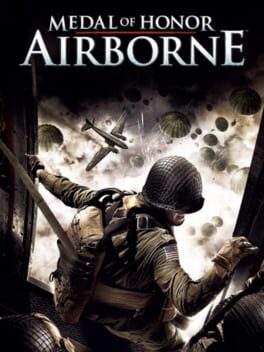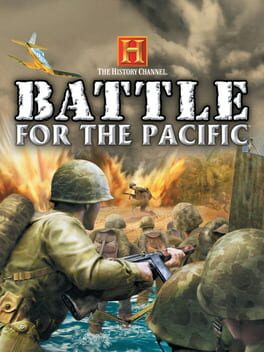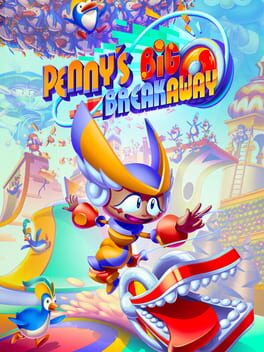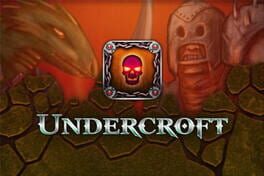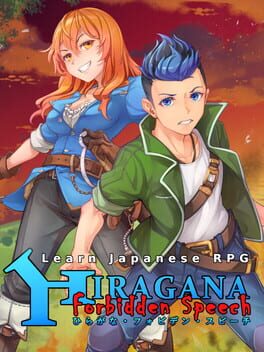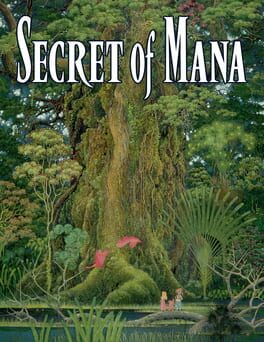Rorenado
A fun, little puzzle game with a simple objective of getting hearts and saving cats, with a gravity and antigravity mechanic. Definitely a fun pick-up-and-play game.
A very good demo for Bravely Second that introduces some of the new jobs, with other classic jobs sprinkled in. It has its own unique story, with its own set of side quests (for extra jobs, like Red Mage). At 10 hours, it's a pretty sizable experience, and it's basically its own game.
2012
Pretty fun game for people who suck at Rock Band, like me. But seriously, a great and easy to play version of Rock Band that has a decent track list, but has a good degree of compatibility with past Rock Band DLC.
Played on HorizonXI
Decided to give this game a go again to see if I was wearing nostalgia goggles for it, and yes. Yes, I was. While I appreciate the sheer complexity of the game, it's often to its own detriment. It also takes so long to get about anywhere. Travel is very player-unfriendly. It takes too long to get anywhere at lower levels.
It also takes entirely too long to gain levels early on. I get level 50 to 51 taking a while, but level 13 to 14 takes entirely too long if you are solo (or even in a party).
The story is also just not really there until later in the missions. The whole experience is a bit too hands-off and free form. And while I appreciate some aspects of it, like not being locked to a specific role for parties.
Also, I forgot the XP loss system for dying, and how harsh it can be.
All in all, it's still a wonderful game, but looking back I never felt like I was engaged with the game, but rather was in awe of its complexity. I'm glad that people are still having fun playing this, and I may come back to it one day when I have a little more time and patience for it.
Decided to give this game a go again to see if I was wearing nostalgia goggles for it, and yes. Yes, I was. While I appreciate the sheer complexity of the game, it's often to its own detriment. It also takes so long to get about anywhere. Travel is very player-unfriendly. It takes too long to get anywhere at lower levels.
It also takes entirely too long to gain levels early on. I get level 50 to 51 taking a while, but level 13 to 14 takes entirely too long if you are solo (or even in a party).
The story is also just not really there until later in the missions. The whole experience is a bit too hands-off and free form. And while I appreciate some aspects of it, like not being locked to a specific role for parties.
Also, I forgot the XP loss system for dying, and how harsh it can be.
All in all, it's still a wonderful game, but looking back I never felt like I was engaged with the game, but rather was in awe of its complexity. I'm glad that people are still having fun playing this, and I may come back to it one day when I have a little more time and patience for it.
2009
Honestly, I really liked this. There are some things I'd have changed, such as how some physics objects work. But overall, it's a great game with some really neat ideas. I like how the veil changes the world, and the abilities felt excellent. I didn't use shield that much, but the others were perfect, especially overpower, when you learned you can use it for more than opening some doors.
Definitely didn't deserve the hate it got, and I'm sad that the only way to experience this is via physical formats. Really wish Id would re-release this. It may not be for all super hardcore Wolfenstein and DOOM fans, but it's got its own charm and appeal.
The supernatural stuff is really neat set dressing for a game set in this time period. I kinda wish it were used more. Hopefully, people will revisit this game and realize that it had some great ideas.
Definitely didn't deserve the hate it got, and I'm sad that the only way to experience this is via physical formats. Really wish Id would re-release this. It may not be for all super hardcore Wolfenstein and DOOM fans, but it's got its own charm and appeal.
The supernatural stuff is really neat set dressing for a game set in this time period. I kinda wish it were used more. Hopefully, people will revisit this game and realize that it had some great ideas.
2010
A very short campaign where I could never figure out quite what was happening. Some decent, if uninspired, gameplay. You can definitely feel EA chasing Modern Warfare's fame here. However, it ends up being just okay. I guess the good thing for PS3 owners is that we got Frontline with this, too.
I will say that the mission that has you and your squad trapped in a quickly disintegrating house was fantastic. Really amped up the tension and made the battle very dynamic.
I will say that the mission that has you and your squad trapped in a quickly disintegrating house was fantastic. Really amped up the tension and made the battle very dynamic.
This game has some interesting ideas, but at only four hours of playtime, it doesn't really have the time to build on them. There's just so little meat on the bones here. And there's so little replay value in this game. Some of the roguelike stuff is interesting, but again, the game is too short for it to be developed.
Medal of Honor: Airborne takes a lot of the traditional WWII FPS genre and changes it up a little. Maps are now nonlinear, and you have a pretty good choice of where you can start, and there are even bonuses for parachuting into specific areas.
The enemy AI is very reactive, and will avoid fire and grenades. However, later enemies get a bit wild, particularly in the last level, with machine gun wield super enemies and panzerschreck wielding enemies that can be difficult to take down.
Thankfully, the weapon system allows you to upgrade weapons up to three times. This includes things like faster firing, scopes, quicker reloads, better zooms, and capacity upgrades. This makes it so that you want to experiment with the weapons, which is a nice addition to the gameplay.
However, speaking of the gameplay, this is way too short of a game. Yeah, I get that multiplayer was where everyone was being funneled during this game's release, but the single-player campaign is very slim. At least a few more missions would have been appreciated. Which tells you how much I loved the game: I wanted more!
All in all, Airborne is a great experience, and the last great WWII FPS games from this franchise. After this game, MoH tried to chase CoD a bit too much and suffered as a result. I hope one day this game could be revisited by the devs and expanded upon. The ideas were solid and ahead of their time, but the game's short campaign really hampers it.
TL;DR: Really great game, but way too short.
The enemy AI is very reactive, and will avoid fire and grenades. However, later enemies get a bit wild, particularly in the last level, with machine gun wield super enemies and panzerschreck wielding enemies that can be difficult to take down.
Thankfully, the weapon system allows you to upgrade weapons up to three times. This includes things like faster firing, scopes, quicker reloads, better zooms, and capacity upgrades. This makes it so that you want to experiment with the weapons, which is a nice addition to the gameplay.
However, speaking of the gameplay, this is way too short of a game. Yeah, I get that multiplayer was where everyone was being funneled during this game's release, but the single-player campaign is very slim. At least a few more missions would have been appreciated. Which tells you how much I loved the game: I wanted more!
All in all, Airborne is a great experience, and the last great WWII FPS games from this franchise. After this game, MoH tried to chase CoD a bit too much and suffered as a result. I hope one day this game could be revisited by the devs and expanded upon. The ideas were solid and ahead of their time, but the game's short campaign really hampers it.
TL;DR: Really great game, but way too short.
It's a very basic WWII FPS, like VERY basic. The gameplay is very clunky and unrefined. Guns just don't feel very good to use, and enemy AI is very dumb. They'll just stand there and shoot. The story is also almost nonexistent. Like, the best part is the archival footage found in the game, but other games, like Medal of Honor, have done this WAY better.
This is a game that was made on a shoestring budget, made to cash in on the popularity of this genre of shooters (which was beginning to fade thanks to COD), and it's pretty obvious.
This is a game that was made on a shoestring budget, made to cash in on the popularity of this genre of shooters (which was beginning to fade thanks to COD), and it's pretty obvious.
The game has some charming aspects, but its muddy backgrounds, lack of camera control, and frustratingly long levels really detract from the experience.
This review contains spoilers
Final Fantasy VII Rebirth's story for the most part is a great retelling of the original game. However, the biggest issue for me is how confusing the ending could be seen. There are hints for those looking, particularly with the Stamp theory, but it's going to fly over a lot of people's heads.
The rest of the story, up to Chapter 14 is just really well done, however, with new reveals and background insights that help give us a better sense of each character. Cait Sith is purposefully underdeveloped some, but I think it does serve a purpose that will be brought out in the third game more, especially if you know his lore.
The combat remains great, and is made even better with some new and updated combat styles and materia. Each character has a specific play style that suits their background. Red XIII feels great to play, particularly once you understand how his mechanics function.
The devs, however, didn't need to add in Sephiroth as the final boss again. He's supposed to be this threat from the shadows, with Jenova acting as the vehicle for his terrible actions. However, we just keep fighting him in each of these games in the Remake trilogy. It's taking the impact out of seeing and fighting Sephiroth.
The biggest down spot for me here are the sheer amount of mini-games. Most are not that fun to play, and sometimes this title felt more like a Mario Party collection than a Final Fantasy game. The Gold Saucer games are very well-thought-out, but everything else feels like a chore to play, particularly this version of Fort Condor, which feels like a step-down from the version in Intermission, which was really fun. So, making it worse feels bad. Queen's Blood, on the other hand, is a masterpiece of game design.
TL;DR: As a total package, it's still a great game, and I really enjoyed it. The story, for the most part, is very good, but is a bit muddled at the end. The gameplay is also stellar, but the mini-games can be a bit grating.
The rest of the story, up to Chapter 14 is just really well done, however, with new reveals and background insights that help give us a better sense of each character. Cait Sith is purposefully underdeveloped some, but I think it does serve a purpose that will be brought out in the third game more, especially if you know his lore.
The combat remains great, and is made even better with some new and updated combat styles and materia. Each character has a specific play style that suits their background. Red XIII feels great to play, particularly once you understand how his mechanics function.
The devs, however, didn't need to add in Sephiroth as the final boss again. He's supposed to be this threat from the shadows, with Jenova acting as the vehicle for his terrible actions. However, we just keep fighting him in each of these games in the Remake trilogy. It's taking the impact out of seeing and fighting Sephiroth.
The biggest down spot for me here are the sheer amount of mini-games. Most are not that fun to play, and sometimes this title felt more like a Mario Party collection than a Final Fantasy game. The Gold Saucer games are very well-thought-out, but everything else feels like a chore to play, particularly this version of Fort Condor, which feels like a step-down from the version in Intermission, which was really fun. So, making it worse feels bad. Queen's Blood, on the other hand, is a masterpiece of game design.
TL;DR: As a total package, it's still a great game, and I really enjoyed it. The story, for the most part, is very good, but is a bit muddled at the end. The gameplay is also stellar, but the mini-games can be a bit grating.
2010
For a free mobile game, this really ruled. It was actually a pretty deep RPG that was over 20 hours. A few classes, but pretty decent combat. If you ever get a chance, you can download the Windows version here:
https://www.rakeingrass.com/games/undercroft/
https://www.rakeingrass.com/games/undercroft/
It's an okay game, but the teaching part is what you're here for. It has pretty good lessons, with speaking parts to let you know what how the Hiragana characters are pronounced. However, a lot of these come very quickly, and it can be difficult to remember everything.
2018
A bit too grindy for my tastes. There are several difficulty spikes early on, and while I loved the SNES original with other players alongside me, the single player AI is just terrible. Some of the voice work is good, though, but I don't really care for the orchestral OST. Thankfully, the original is still there.
No matter how many times I play this, I find something new each time. With the IP basically being dead after the goings-on at ZA/UM, it's a shame we'll never get a true sequel to this absolute masterpiece of a game.
The true beauty of Disco Elysium is its ability to critique the ideas the writers were trying to put across. Much like all the characters, we are all imperfect beings, but can make small changes to help make the hell we live in just a little bit nicer.
The true beauty of Disco Elysium is its ability to critique the ideas the writers were trying to put across. Much like all the characters, we are all imperfect beings, but can make small changes to help make the hell we live in just a little bit nicer.
